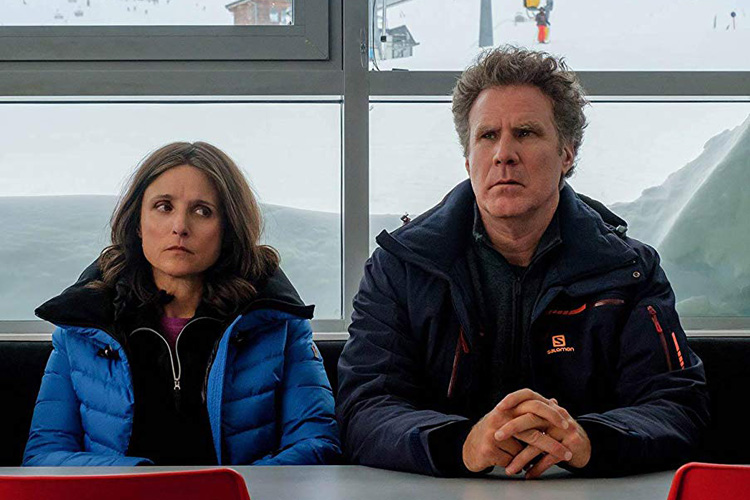Downhill belongs to a risky bet of a genre: American remakes of excellent foreign films. Even legendary directors have a tough time pulling the gamble off—Spike Lee’s remake of Park Chan-wook’s Oldboy, for example, is little more than a pale imitation. Comedy remakes are usually the worst of the bunch, due to Hollywood’s penchant for “dumbing things down” for American audiences. Just look at the quality gap between French comedy Le Dîner de Cons and its American remake Dinner for Schmucks. Downhill is at an immediate disadvantage in the inevitable comparison game: Force Majeure, the Swedish comedy it’s based on, is very, very good.
Though it’s a bit unfair to compare remakes to their originals by every criterion. Force Majeure is subtle, dark, brilliant satire; but that doesn’t mean Downhill has to check all the same boxes. There are plenty of broad comedies that are more effective than low-key satires. The key to a good American remake, it seems, is doing something different—Scorsese’s The Departed is technically a remake of the Chinese film Internal Affairs, but it uses its predecessor as more of a sketch than a blueprint, finding fertile ground in its distinctly American details. When Downhill deviates like that, it feels special.
Its carving of its own path mostly comes through in its performances. The plot setup is the same as Force Majeure’s: when a family on ski vacation mistakes a controlled avalanche for a real one, the father (Will Ferrell) runs away to protect himself while the mother (Julia Louis-Dreyfus) embraces her kids and prepares for impact, leading to tension between the two in the aftermath. Ferrell and Louis-Dreyfus use this setup to key into gender dynamics that feel raw, honest, and contextualized by their American backgrounds.
Ferrell, in his first (semi) serious role since Everything Must Go a decade ago, transcends his signature raucousness for a more restrained performative statement. He strikes a familiar chord: the American man who, despite never being the picture of masculinity in the first place, retained a shred of authority by virtue of being male, watching helplessly as his authority dissipates in a more egalitarian society. His soft eyes and stubborn refusal to submit tell a cultural story. Louis-Dreyfus, shattered by her husband’s betrayal, is exceptional as a woman not yet accustomed to the power of her righteous anger. Her voice is tremendous in its trembling—it’s the kind of performance that’ll be unjustly overlooked by the end of the year.
Unfortunately, Louis-Dreyfus and Ferrell do most of the movie’s heavy lifting, as the rest of Downhill plays like a cloying imitation of Force Majeure that doesn’t understand why the original worked so well. After its faux-disaster introduction, Force Majeure evolved into a cutting commentary on masculinity and monogamy, with every dynamic revolving around that thesis. Instead of committing to something unique, Downhill clomps through the original’s footsteps without its satire or commentary. This is never more evident than in the movie’s club scene: in Force Majeure, the narrative pauses for a montage of men ritualistically shouting at each other in a club, like a disorienting, hypermasculine version of Midsommar’s communal sobbing scene. In Downhill, Will Ferrell meanders around a club, almost gets in a fight, and then deflates the situation with a silly joke. It’s hollow mimicry.
Downhill has moments of fresh deviation, like an inspired scene where Ferrell pressures his son into sportsmanlike competition, but they’re few and far between. Where Force Majeure had a complicated polyamorous character, Downhill has Miranda Otto put on a ridiculous German accent while laughing about sleeping around, and that’s just what Americans get, I suppose.
★★½ (2.5/5)




